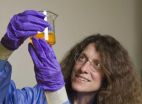(Press-News.org) Repeated unnecessary 911 calls are a common drain on the manpower and finances of emergency medical services, but a pilot program that identified Baltimore City's top 911 callers and coupled them with a case worker has succeeded in drastically cutting the number of such calls while helping callers get proper care.
The program, called Operation Care, was conceived and implemented by the non-profit agency Baltimore HealthCare Access and ran as a three-month pilot in 2008. Now, a newly published report of its results appearing in The American Journal of Emergency Medicine can help illuminate strategies for other emergency medical services (EMS) departments around the country that may be plagued by the same problem, says the report's lead author.
"The original idea was to help these frequent callers get better access to medical and other care and, in doing so, Baltimore City ended up saving money and resources, a welcome side effect," says lead author Michael Rinke, M.D., a pediatrician and a quality and safety expert at Johns Hopkins Children's Center.
As fire departments around the country continue to get their budgets slashed, finding ways to trim costs while maintaining the same level of service will be increasingly important, the researchers say.
In three months, the program generated savings of more than $14,300, more than $6,300 of which was for the city fire department. The real savings are probably greater, as this number did not factor in any money saved from unnecessary trips to the ER and freeing up ambulances for other callers.
The Baltimore City Fire Department, which responds to nearly 150,000 emergency calls each year, has continued to fund the program, providing a nurse and a case manager for repeat 911 callers.
In 2007, two Baltimore City residents were responsible for more than 60 emergency calls, another resident made 110 calls to 911, and yet another one made 147 such calls, the investigators say. Each 911 call requires EMS to dispatch an ambulance to the caller.
Repeated 911 callers, the researchers reasoned, may face problems such as lack of health insurance and access to routine medical care or an inability to navigate the labyrinth of healthcare services. The findings of the study suggest they were mostly right. Examining a year's worth of 911 call logs, the researchers identified Baltimore City's 25 most frequent 911 callers, 10 of whom enrolled in the three-month program for weekly sessions with a case worker who assessed their medical needs, taught them how to navigate the health care system, put them in touch with primary care physicians and specialists, referred them to various support programs and educated them on ways to limit 911 calls to true emergencies.
Collectively, the 10 callers made 520 calls to 911 in the year preceding their enrollment. Based on their call pattern from the previous year, the researchers estimated that these 10 people would make 100 calls to 911 during the three months of the program. Somewhat to the researchers' surprise, there were only 57 calls, nearly half as many as they had predicted.
Nine of the 10 patients had insurance, mostly through Medicare. All 10 patients had two or more chronic conditions, including hypertension, diabetes and heart disease. Seven had either a mental health or a substance abuse problem or both. The average age was 60 years, ranging from 39 to 89 years. The case manager referred patients to insurance assistance programs, medical specialists, adult-care services, food services like Meals on Wheels, psychiatric evaluation and support groups for substance abuse. Nearly 70 percent of the referrals were to non-medical services.
"This program highlights the importance of simple interventions that can yield powerful results," says co-investigator Kathleen Westcoat, M.P.H., of Baltimore HealthCare Access. "For example making sure that a diabetic patient doesn't run out of strips for the glucose monitor can prevent a frantic 911 call for a non-emergency."
None of the patients reported that they hesitated to call 911 in true emergencies and said that they experienced no adverse health effects as a result of the program.
The investigators caution that though these findings are insightful, their relevance is difficult to gauge because they are based on a small number of patients.
###Co-investigators on the report include Elisabeth Dietrich, B.A., of the Baltimore City Health Department, now at the University of California-San Francisco; and Traci Kodeck, M.P.H., of Baltimore HealthCare Access.
Targeting top 911 callers can trim cost, improve patient care
2011-04-15
ELSE PRESS RELEASES FROM THIS DATE:
Studies of marine animals aim to help prevent rejection of transplanted organs
2011-04-15
(Santa Barbara, Calif.) –– Studies of the small sea squirt may ultimately help solve the problem of rejection of organ and bone marrow transplants in humans, according to scientists at UC Santa Barbara.
An average of 20 registered patients die every day waiting for transplants, due to the shortage of matching donor organs. More than 110,000 people are currently waiting for organ transplants in the U.S. alone. Currently, only one in 20,000 donors are a match for a patient waiting for a transplant.
These grim statistics drive scientists like Anthony W. De Tomaso, assistant ...
Older workers benefit from high-tech, high-touch health promotion
2011-04-15
Older workers benefit most from a modest health behavior program when it combines a web-based risk assessment with personal coaching.
University of Illinois at Chicago researchers conducted a randomized trial to evaluate two worksite wellness interventions assessing older workers' health behaviors and outcomes. The findings are available online and will be published in an upcoming issue of the American Journal of Public Health.
The health behaviors that were examined were physical activity, diet, stress reduction and smoking cessation, says Susan Hughes, professor of ...
Novel therapy improves immune function in teen with rare disease
2011-04-15
In a novel approach that works around the gene defect in Wiskott-Aldrich syndrome, an inherited immune deficiency disorder, researchers used an alternative cell signaling pathway to significantly improve immune function in a 13-year-old boy with the disease. The study, at The Children's Hospital of Philadelphia, provides a proof-of-principle that immunotherapy, which harnesses elements of the body's immune system, may be used to treat this rare but often deadly disorder.
"If this encouraging initial result holds up in further ...
Inability to detect sarcasm, lies may be early sign of dementia, UCSF study shows
2011-04-15
By asking a group of older adults to analyze videos of other people conversing -- some talking truthfully, some insincerely -- a group of scientists at the University of California, San Francisco has determined which areas of the brain govern a person's ability to detect sarcasm and lies.
Some of the adults in the group were healthy, but many of the test subjects had neurodegenerative diseases that cause certain parts of the brain to deteriorate. The UCSF team mapped their brains using magnetic resonance imaging, MRI, which showed associations between the deteriorations ...
Recipe for radioactive compounds aids nuclear waste and fuel storage pools studies
2011-04-15
ALBUQUERQUE, N.M. — Easy-to-follow recipes for radioactive compounds like those found in nuclear fuel storage pools, liquid waste containment areas and other contaminated aqueous environments have been developed by researchers at Sandia National Laboratories.
"The need to understand the chemistry of these compounds has never been more urgent, and these recipes facilitate their study," principal investigator May Nyman said of her group's success in encouraging significant amounts of relevant compounds to self-assemble.
The trick to the recipes is choosing the right templates. ...
Hydrocarbons in the deep earth
2011-04-15
LIVERMORE, Calif. -- A new computational study published in the Proceedings of the National Academy of Sciences reveals how hydrocarbons may be formed from methane in deep Earth at extreme pressures and temperatures.
The thermodynamic and kinetic properties of hydrocarbons at high pressures and temperature are important for understanding carbon reservoirs and fluxes in Earth.
The work provides a basis for understanding experiments that demonstrated polymerization of methane to form high hydrocarbons and earlier methane forming reactions under pressure.
Hydrocarbons ...
Caltech researchers use GPS data to model effects of tidal loads on Earth's surface
2011-04-15
PASADENA, Calif.—For many people, Global Positioning System (GPS) satellite technology is little more than a high-tech version of a traditional paper map. Used in automobile navigation systems and smart phones, GPS helps folks find their way around a new neighborhood or locate a nearby restaurant. But GPS is doing much, much more for researchers at the California Institute of Technology (Caltech): it's helping them find their way to a more complete understanding of Earth's interior structure.
Up until now, the best way to explore Earth's internal structures—to measure ...
Warning to breastfeeding mothers
2011-04-15
Los Angeles, CA (April 7, 2011) While breastfeeding babies has numerous health advantages to both mother and child, mothers who breastfeed may find that other people look down on them and do not want to work with them. A recent study released by Personality and Social Psychology Bulletin (published by SAGE) found that mothers who breastfeed are viewed as less competent than other women.
Researchers conducted three varying double blind studies to determine the views of others towards breastfeeding moms. One study, for example, asked participants to measure the competence, ...
People know when first impressions are accurate
2011-04-15
First impressions are important, and they usually contain a healthy dose both of accuracy and misperception. But do people know when their first impressions are correct? They do reasonably well, according to a study in the current Social Psychological and Personality Science (published by SAGE).
Researchers had two separate groups of more than100 people meet in a "getting-acquainted" session much like speed-dating, until the people had spoken with everyone else in the group for three minutes each. At the end of each 3-minute chat, they rated each other's personalities, ...
Search for dark matters moves one step closer to detecting elusive particle
2011-04-15
Dark matter, the mysterious substance that may account for nearly 25 percent of the universe, has so far evaded direct observation. But researchers from UCLA, Columbia University and other institutions participating in the international XENON collaboration say they are now closer than ever before.
Their new results, announced today at the Gran Sasso National Laboratory in Italy, where the XENON experiment is housed deep beneath a mountain 70 miles west of Rome, represent the highest-sensitivity search for dark matter yet, with background noise 100 times lower than competing ...



